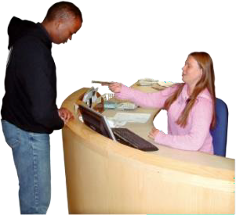 |
A Deep Vein Thrombosis (DVT) is a blood clot in one of the deep blood vessels in your body - it usually happens in one leg, but can happen in any of your deep veins |
 |
The symptoms of a DVT |
 |
|
 |
These symptoms can also happen in your arm or stomach if that's where the blood clot happens to be |
 |
Things that can cause a DVT |
 |
|
 |
|
 |
|
 |
|
 |
|
 |
|
 |
|
 |
|
 |
|
 |
|
 |
Sometimes it's hard for us to know why you have a blood clot - if this is the case your team will refer you to a specialist |
 |
The treatment for a DVT |
 |
The main treatment is called an anticoagulant Anticoagulant is a type of medicine known as a blood thinner - you may have injections or tablets that will stop your blood from clotting easily |
 |
Your body slowly absorbs the medicine - it makes the swelling go down and lowers the risk of you getting another clot |
 |
over several days of treatment, the pain and swelling should go away |
 |
Sometimes you might need surgery, but this does not happen often |
 |
We usually suggest you carry on taking your medications for at least 3 months - you may need to take them for longer or sometimes for life |
 |
A special blood test will help decide if this is the right treatment for you |
 |
The follow up for a DVT |
 |
We will refer you to an anticoagulation clinic - the team will check there are no problems with the medicine you are taking |
 |
They may do some blood tests and will answer any questions you may have |
 |
We may refer you to another clinic if we think you need some more tests |
 |
Getting urgent helpYou must get medical help straight away... |
 |
|
 |
|
 |
|
 |
|
 |
|
 |
After you get home |
 |
You may not be able to do as much physical activity as usual |
 |
Avoid long periods of exercise in the first few weeks |
 |
If you need a painkiller, take a paracetamol |
 |
You must not take aspirin, ibuprofen, naproxen or diclofenac These medicines are anti-inflammatories and may interfere with your treatment and possibly increase the risk of bleeding |
 |
Always check with your GP or pharmacist before taking any medicines to make sure they are safe to take with your treatment - this includes anything you buy over the counter |
 |
Eat a healthy diet and watch your weight |
 |
Alcohol can stop your anticoagulant medicine working properly - we suggest you do not drink more than 1 or 2 units of alcohol each day |
 |
Alcohol increases your risk of falls and injuries - these can be more serious if you are taking an anticoagulant |
 |
Don't do any long distance travel for up to 2 weeks |
Post-thrombotic syndrome (PTS) |
|
 |
A common thing to get if you have a DVT is PTS - symptoms of PTS include leg swelling, varicose veins and sometimes leg ulcers |
 |
Compression socks may help - but you should not wear them until the swelling in your leg has settled |
 |
Walking and exercise lower your risk of getting PTS |
 |
You could have more chance of having another blood clot in the future, compared to someone who has never had a blood clot |
 |
Make sure you tell any healthcare professionals you see that you have a history of blood clots - this may affect your treatment |
 |
Useful information |
 |
nhs.uk/ UCLH cannot accept responsibility for information provided by other organisations |
Contact details |
|
 |
Emergency Services Division 4th Floor East, 250 Euston Road, London NW1 2PG
02034 37 98 89 |
DVT easy read
Click here to download the PDFPage last updated: 09 September 2025
Review due: 01 October 2026